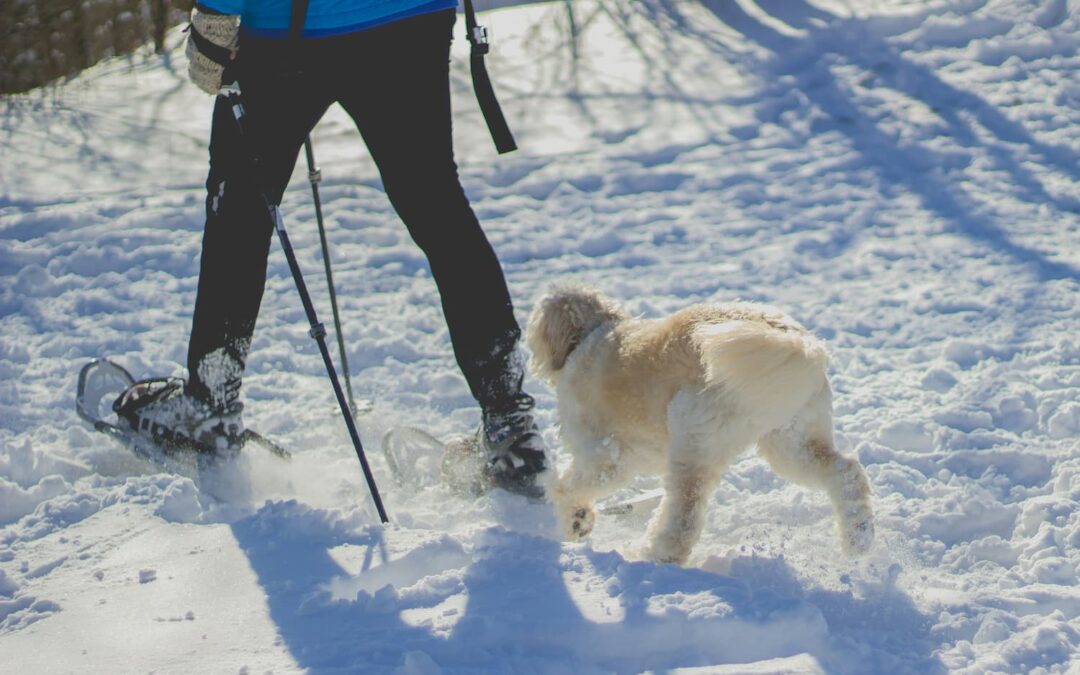As temperatures drop and snow blankets the ground in Cloquet, MN, it’s important to consider how the cold weather affects your pet’s health. While many pets, particularly dogs and cats, have thick fur to help protect them from the cold, it doesn’t fully shield them from the dangers that winter brings. In fact, the winter season poses unique risks for our pets, such as frostbite, dry skin, and even toxic exposure to substances like antifreeze.
Cold weather preventive care is essential to ensure that your pet stays healthy, comfortable, and safe during the winter months. By taking a few simple precautions, you can help protect your pet from the challenges that come with cold temperatures, snow, and ice. Whether your pet enjoys short play sessions outside in the snow or prefers cozying up indoors, we’ve got you covered with tips to keep your furry friend well this winter.
Why Cold Weather Affects Pets
Fur offers some protection, but pets aren’t immune to cold weather. Factors like wind, snow, and prolonged outdoor exposure make pets vulnerable to frostbite and hypothermia. Small breeds, senior pets, and those with health conditions are particularly at risk.
- Fur Provides Protection, But It’s Not Enough: Fur helps trap warmth but isn’t enough in freezing temperatures. Wet fur loses its insulating ability, especially in short-haired or thin-coated pets. Extra layers like jackets or sweaters are often necessary.
- The Dangers of Frostbite and Hypothermia: Frostbite affects areas like paws, ears, and tails, leading to tissue damage. Hypothermia causes lethargy and shivering, and in severe cases, it can be life-threatening. Immediate veterinary care is crucial if these conditions occur.
- Vulnerable Areas: Paws, Ears, and Tails: Paws, ears, and tails are most exposed to cold. Frostbite, cracking, and irritation are common in these areas, especially if exposed to snow, ice, or salt. Booties or protective balms can help.
- Pets at Higher Risk in Cold Weather: Small breeds, short-haired pets, seniors, and pets with health issues are more sensitive to cold. Puppies and kittens also struggle to regulate body temperature and need extra warmth.
- Cold Weather Can Affect Pets Faster Than Expected: Pets can feel the effects of cold quickly, sometimes within 15-30 minutes. Shivering, whining, and lifting paws are signs that it’s time to bring them indoors. Keep outdoor time brief to avoid risks.
Winter Wellness Tips for Dogs and Cats
When it comes to winter wellness for pets, a few changes to your daily routine can make a big difference in helping your pet stay warm and healthy throughout the colder months. Here are some practical tips to keep your pet safe this winter:
- Protect Their Paws
Snow, ice, and salt can harm your pet’s paws. Booties provide protection, but if your pet doesn’t tolerate them, paw balms can be a good alternative. Always check their paws after walks for salt or ice buildup and wash them to avoid irritation or ingestion of harmful substances.
- Keep Pets Warm Indoors
Ensure your pet has a cozy, warm place to relax inside, especially during extreme cold. Adding extra blankets or a heated pet bed can help, and avoid placing their bed near drafts. Limit their outdoor time during freezing temperatures to prevent frostbite or hypothermia.
- Access to Fresh Water
Pets need fresh water year-round. In winter, outdoor water bowls can freeze, so check frequently. Heated water bowls are a good option for pets spending time outdoors, ensuring they stay hydrated even in freezing conditions.
- Nutrition Adjustments
Activity levels may vary in winter. Active pets may need more calories to maintain energy, while less active pets could benefit from portion control to avoid weight gain. Consulting our veterinarians can help you make the right adjustments to your pet’s diet during the winter months.
Outdoor Safety Tips
Winter brings its own set of hazards for pets that spend time outdoors, but with the right precautions, you can still let your pet enjoy the winter weather safely:
- Limit Outdoor Time: Keep outdoor time short during cold weather, as frostbite can occur in as little as 30 minutes. Supervise your pet to ensure they’re comfortable and bring them inside if they show signs of getting too cold.
- Provide Proper Shelter: If your pet spends time outdoors, ensure they have a warm, insulated shelter, raised off the ground, and positioned away from the wind to protect them from harsh weather.
- Antifreeze Danger: Antifreeze is highly toxic to pets but has a sweet taste that attracts them. Store it securely, clean up spills immediately, and watch for poisoning symptoms like vomiting or lethargy.
- Watch for Signs of Frostbite or Hypothermia: Signs of frostbite include pale or swollen paws, ears, and tails. Hypothermia symptoms include shivering, lethargy, and shallow breathing. If you notice these signs, bring your pet indoors and contact us immediately.
Veterinary Care is Essential During the Winter Months
Winter wellness exams are crucial to ensure your pet stays healthy during the colder months. Regular veterinary check ups allow your vet to assess your pet’s overall condition, including any winter-specific concerns such as joint pain, weight changes, and respiratory issues. These exams are especially important for senior pets or those with health conditions.
Regular checkups help monitor and manage conditions that may worsen in cold weather, like arthritis or respiratory problems. Your vet can also evaluate your pet’s weight, which might fluctuate due to changes in activity levels during winter.
Winter Wellness Exams: Identifying Underlying Health Concerns
Winter wellness exams focus on areas like joint health, skin and coat condition, and respiratory function. Vets check for stiffness from arthritis, dry skin due to winter air, and breathing issues that may be aggravated by cold temperatures, ensuring your pet stays comfortable.
Maintaining Vaccination Schedules and Year-Round Parasite Prevention:
Despite the cold, parasites like fleas and ticks can still pose a threat. Year-round prevention for fleas, ticks, and heartworm is essential. Vaccinations also protect your pet from illnesses like kennel cough, which can spread in indoor settings during winter.
Cloquet Animal Hospital provides personalized winter care advice, covering topics like joint supplements, nutrition, and cold-weather gear. Our veterinarians offer tailored solutions to help your pet stay safe and healthy all winter long.
Keep Your Pet Safe This Winter
The cold weather can be tough on our furry friends, but with the right preventive care, you can help protect your pet and ensure they stay happy and healthy all season long. From protecting their paws to ensuring they have a warm place to rest, small changes can make a big difference in your pet’s winter wellness.
To help your pet prepare for the winter months, schedule a wellness exam at Cloquet Animal Hospital today. Call us at (218) 879-9280. Plus, don’t forget to check out our online pharmacy for winter products like booties, paw balms, and supplements to help keep your pet safe and comfortable all winter long.
FAQs About Winter Pet Care
- How long can my pet safely stay outside in the cold?
Depending on the temperature, small dogs or short-haired pets should only stay outside for short periods (10-15 minutes). Monitor your pet for signs of discomfort and bring them indoors if they begin to shiver or seem cold.
- Does my dog or cat need a coat during winter?
Pets with thin coats or short hair benefit from extra insulation, especially during walks. Small dogs, senior pets, and pets with medical conditions are often more comfortable wearing a sweater or coat in cold weather.
- Can pets get frostbite?
Yes, frostbite can affect pets, particularly their ears, tails, and paws. Signs include pale, cold skin that becomes red and swollen when rewarmed. Immediate veterinary care is required if frostbite is suspected.
- Is it safe to use ice melt and salt around pets?
Not all ice melts are safe for pets. Look for pet-friendly options and avoid walking your pet on surfaces treated with regular salt, as it can irritate their paws. Keep your pet’s paws clean and healthy by wiping them down after walks.
- What should I do if my pet ingests antifreeze?
If you suspect your pet has ingested antifreeze, contact your veterinarian immediately. Antifreeze is highly toxic and requires prompt treatment to prevent serious complications or death.
Image Credit: Unsplash

